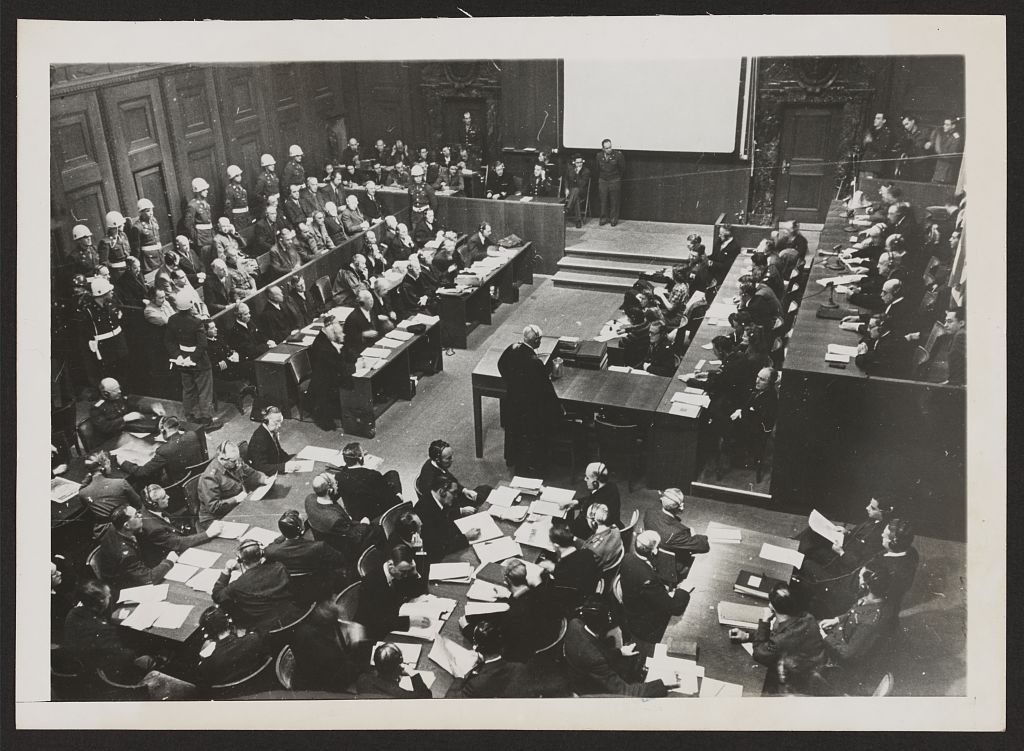Updated 05-21-2022
Read “Massachusetts Passes Genocide Education Legislation" by Emerging America's Rich Cairn in June's Abraham Lincoln Brigade Archives The Volunteer.
In December 2021, Massachusetts became the 20th state to pass legislation requiring that every student learn about genocide. (See the Massachusetts law.) The law pointedly requires that students learn about human rights and genocides across history. In this Month’s post, we offer a selection of resources to help address this imperative.
The Massachusetts Department of Elementary and Secondary Education released this FAQ on the Genocide Education legislation on April 6, 2022.
A familiar historic photo from the 1945 Nuremberg Trials shows rows of judges, lawyers, helmeted military police, and defendants packed into the paneled courtroom. The court found defendants guilty of the worst crimes in history, genocide against Jews, Romany, religious minorities, gays, disabled people, and others. Yet the trials themselves also represented a powerful new movement to expand accountability and the rule of law. In response to Nazi crimes, the newly formed United Nations established the World Court in 1946, and in 1948, the UN General Assembly passed the Universal Declaration of Human Rights. Students must learn about the horrors of genocide. They also need to learn about powerful tools to thwart genocide.
Emerging America drafted new lessons on the American Eugenics Movement in the early 20th century as part of a new K-12 Disability History curriculum. The curriculum places agency by disabled people at the center of student investigation. So the lessons on eugenics begin with objections to eugenics in primary sources from the period. A centerpiece of the lesson is a 2012 North Carolina program to set up an Office of Justice to Sterilization Victims and to pay compensation to thousands of disabled people forcibly sterilized by that state. See the curriculum project announcement to learn more and to sign up to pilot materials. (The eugenics lesson is in the unit on the Progressive Era.)
Emerging America has partnered for many years with the Abraham Lincoln Brigade Archives to offer the graduate course for teachers: America and World Fascism: From the Spanish Civil War to Nuremberg and Beyond. Link to course information. (Course runs next in October, 2022.) Registration cost reduced thanks to the Puffin Foundation.
Resources
NEW: The United States U.S. Holocaust Memorial Museum launched the crowd-source project: History Unfolded to utilize American newspapers.
Compiled by Massachusetts educators through the Massachusetts Council for the Social Studies. Any errors are the responsibility of Emerging America.
- Abraham Lincoln Brigade Archives
- Anti-Defamation League. Resources for Educators, Parents & Families.
- Armenian National Institute.
- Bill of Rights Institute. A Peaceful Worker: Eleanor Roosevelt, the U.N. Universal Declaration of Human Rights, and Diligence.
- Boston University. Holocaust, Genocide, and Human Rights Studies.
- California State University Fresno. Human Rights and Genocide Project.
- Equal Justice Initiative. A History of Racial Injustice: Essays on people and events in American history.
- Facing History and Ourselves. Holocaust Denial: How Teachers Can Turn the Tide. Link to Facing History blog.
- Facing History and Ourselves. Universal Declaration of Human Rights.
- Holocaust Museum Houston. Genocide of Indigenous Peoples.
- Human Rights Educators, USA.
- Learning for Justice, formerly known as Teaching Tolerance, education program of the Southern Poverty Law Center. Link to teaching resources and film, One Survivor Remembers.
- Library of Congress. Nuremberg Trial Verdicts. Law Library blog post on the Nuremberg Trials.
- Life After Hate. Winner of the Abraham Lincoln Brigade Archives and Puffin Foundation 2022 Human Rights award for its work with former members of violent far-right groups.
- Museum of Tolerance.
- The Ninth Candle
- Northeastern University. Holocaust and Genocide Studies.
- Oxford Academic. Holocaust and Genocide Studies.
- Oxford Research Encyclopedia. Genocide and American Indian History
- Salem State University. Center for Holocaust and Genocide Studies.
- Simon Wiesenthal Center.
- Teaching for Change.
- United Nations Office on Genocide Prevention and the Responsibility to Protect.
- University of Massachusetts Amherst. Institute for Holocaust, Genocide, and Memory Studies.
- University of Minnesota. Holocaust and Genocide Studies.
- United States Holocaust Memorial Museum.
- Upstander Project.
- World Without Genocide Educational Resources.
- Zinn Education Project.
Young Adult Literature
- The Assignment. Liza Wiemer. Delacorte Press. (2020).
Current Media
- “How We Get Holocaust Education Wrong” by Luke Berryman in Education Week, February 9, 2022 (Vol. 41, #21, p. 20); here is The Ninth Candle’s website.
- "The Psychology of Domestic Terrorists: Eliminationism – We live in a soup of extremist attitudes." by Darcia F. Narvaez. Psychology Today, October 18, 2020.
- "Myanmar committed genocide against Rohingya, US declares," by Ben Fox, Associated Press. Christian Science Monitor. March 22, 2022.




